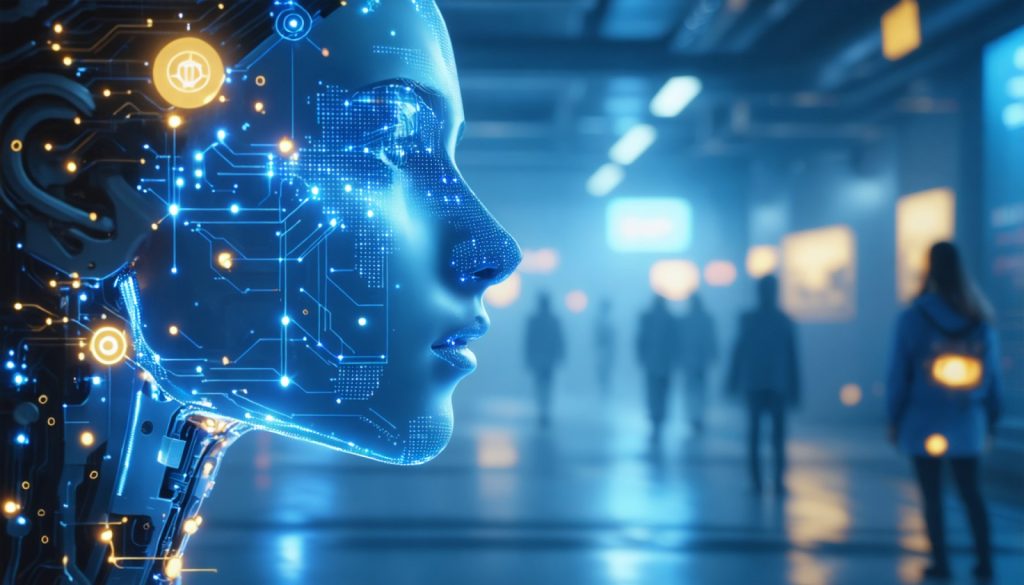
- AI is transitioning from a novelty to a crucial tool, transforming industries and enhancing customer experiences through platforms like Agentforce.
- Agentic AI requires a structured framework, robust information access, and safety parameters for effective deployment.
- Salesforce exemplifies effective AI use, leveraging human experience data to meet user needs and manage customer interactions.
- AI agents provide startups scalability solutions, helping manage growing demands economically.
- Trust is essential to counter AI misinformation, bias, and toxicity, ensuring its outputs are reliable and transparent.
- India’s tech innovation and skilled workforce position it as a leader in AI’s global future.
- The future of AI promises models that interact with the world similarly to human senses, revolutionizing industries like healthcare.
The digital landscape is witnessing a monumental shift as artificial intelligence evolves from a curious novelty to an indispensable ally. No longer the digital blunderer of yesteryear, AI has transformed into a pioneer, charting an ambitious course toward a world once confined to science fiction. Now, it begs a crucial question: Are we ready to embrace its full potential?
Emerging as the architects of this revolution are companies that harness AI’s might—not for novelty, but substantial transformation. With platforms like Agentforce, AI agents are tailored not only to automate but to innovate. These agents delve into tasks once thought exclusive to human domain, leveraging generative AI to reshape business landscapes, enhance customer experience, and redefine industries.
Yet, the rise of what some call “agentic AI” isn’t without trials. The path from concept to implementation is rife with challenges, not least among them the complexity of their deployment. These AI entities demand a clear framework akin to human job roles. They require access to robust information systems, the ability to interact through APIs, and crucially, the presence of guardrails to ensure they operate under parameters of trust and safety.
Salesforce emerges as a beacon in navigating these complexities, tapping into its rich tapestry of understanding human roles across industries to tailor AI functions. By wielding past data and professional insight, Salesforce ensures its AI responds effectively to user needs, already adept at handling the lion’s share of customer inquiries.
For startups, AI agents offer more than convenience—they present a lifeline to scalability. As explained in vivid imagery by industry leaders, these digital assistants scale operations economically, providing startups with tools to handle escalating demands seamlessly.
However, with great power comes the necessity for responsibility. Modern AI can fall victim to misinformation, bias, and toxicity if left unchecked. A layer of trust is imperative, not unlike a wise mentor providing answers backed with sources and transparency. This trust anchors AI to reality, ensuring its solutions are both viable and reliable.
No account of AI’s future is complete without acknowledging India’s pivotal role on this stage. A hub of digital adoption and a treasure trove of talent, India stands poised to lead the charge in this new era. With thriving tech innovations and a workforce adept at pushing boundaries, India is actively scripting the future chapters of the AI narrative.
Looking to the horizon, the advancement of AI doesn’t stop at current breakthroughs. Visionaries see models that sense and perceive the world akin to human senses. Imagine a machine not just interpreting, but engaging with reality in a tactile, immersive manner—ushering in new potentials for industries from healthcare to everyday life.
As we venture into this transformative epoch of AI, we’re at the precipice of change with an innovation engine that promises not just dreams but achievable realities. Our collective readiness to harness this revolution will dictate how brightly the future of AI will shine.
The AI Revolution: Are We Ready For What’s Next?
Artificial intelligence (AI) has evolved significantly, moving from a novel curiosity to becoming an integral part of our daily lives and industries worldwide. As AI technology progresses, it raises the question: Are we truly prepared to harness its full potential? With AI shaping the future across various sectors, we must explore its applications, benefits, risks, and the road ahead.
How AI is Reshaping Industries
AI is no longer restricted to performing basic tasks; it is driving transformation across industries. Companies like Salesforce are integrating AI to revolutionize customer experiences. By analyzing past data and leveraging professional insight, Salesforce ensures its AI solutions align closely with user needs. AI-as-a-Service (AIaaS) platforms enable businesses to manage inquiries effectively, enhancing productivity and customer satisfaction.
For startups, AI is a growth catalyst that enables scalability without a proportionate increase in resources or costs. AI-powered tools like chatbots and virtual assistants help handle growing workloads, allowing startups to focus on strategic initiatives.
Challenges and Limitations
Despite its promise, AI comes with challenges. The deployment of AI systems requires a robust framework, similar to structuring human job roles. These systems need access to comprehensive information via APIs and must operate within protective parameters to ensure trust and safety.
One significant concern is the potential for AI systems to perpetuate misinformation, bias, and toxicity if not monitored. It’s crucial to develop AI models anchored in transparency and equipped to provide reliable, source-backed solutions.
The Role of India in the AI Ecosystem
India is at the forefront of the AI revolution, offering a wealth of tech talent and rapid digital adoption. The Indian workforce’s capabilities in pushing technological boundaries make the nation a pivotal player in this evolving narrative. As India continues to innovate and adapt, it will play a critical role in guiding global AI development.
Future Predictions for AI
Looking ahead, AI’s evolution won’t just stop at analyzing data or automating tasks. Futuristic models aim to perceive and interact with the world, enhancing fields from healthcare to everyday technology experiences. These advancements could see AI systems that interact with environments in a human-like manner, bringing about immersive and transformative industrial applications.
AI Security and Sustainability
Building sustainable and secure AI systems involves addressing vulnerabilities and designing systems that are resistant to emerging threats. Developers must consider AI ethics and devise strategies to minimize environmental impacts, ensuring AI remains a sustainable endeavor.
Actionable Insights
To stay ahead of the AI curve, consider the following steps:
1. Embrace AI Tools: Start integrating AI solutions into your business operations to boost efficiency and innovation.
2. Prioritize Training: Educate teams about AI technologies to improve adaptability and mitigate risks.
3. Implement Safeguards: Develop AI systems with robust security measures to protect against potential misuse.
4. Foster Global Collaborations: Engage with international AI initiatives to stay informed on the latest developments and regulations.
For more insights on AI technology, visit the Salesforce website.
Conclusion
AI is poised to significantly impact the world, offering new possibilities and challenges. By understanding its potential and limitations, businesses and individuals can strategically adopt AI to their advantage. As this technology continues to advance, embracing innovation and preparing for its challenges will be key to success in the AI-driven landscape.



